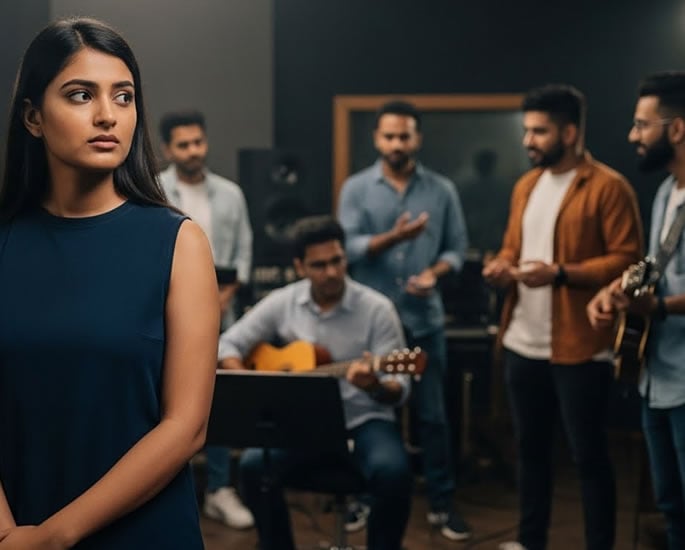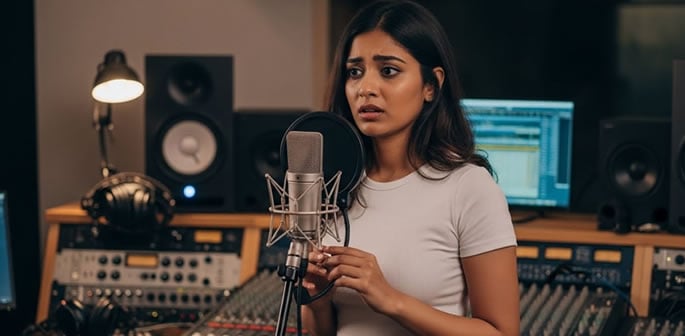36% also reported their personal experiences
A study has revealed that many women in India’s music industry don’t feel safe.
The Spotify-commissioned study by YouGov brings these issues into sharp focus, with safety, mentorship, representation, and work-life balance emerging as key pressure points.
The research surveyed 1,000 respondents from diverse creative and technical roles, with 70% being millennial and Gen Z women.
Its findings reveal how uneven access to opportunities still shapes everyday experiences in the industry.
We delve into these challenges and examine where meaningful change is both possible and urgent.
Safety & Inclusion Remain the Most Urgent Concerns

Safety ranked as the most pressing issue for women in the study, with 56% listing it as a challenge.
Meanwhile, 36% also reported their personal experiences wherein safety and inclusivity was compromised in the workplace.
These accounts reflect systemic gaps across studios, venues, and corporate settings.
The concern spans singers, producers, DJs, technicians, and label staff, showing the breadth of the problem.
Many respondents said unsafe spaces alter career decisions, limit mobility, and reduce confidence in the industry’s infrastructure.
This finding aligns with global studies highlighting safety as a primary barrier for women in creative sectors.
Dhruvank Vaidya, Head of Music and Podcasts at Spotify India, said the findings reaffirm the need for meaningful change:
“Safety, visibility, and inclusion remain central to creating an equitable music industry.”
He referenced Spotify initiatives like EQUAL, which is a women-first platform aimed to provide networking, marketing and mentorship opportunities for women in music
Respondents also identified areas where platforms and brands can help address these gaps.
According to the study, 31% believe companies can best support women by creating safer spaces and community networks that strengthen dialogue and collaboration.
Leadership, Mentorship & the Technical Gap

Growth opportunities remain uneven across the industry, with women in technical roles reporting sharper barriers.
Only 31% of respondents working in production or sound engineering rated their prospects as “excellent”.
Many attributed this to stereotypes about technical roles and minimal female leadership visibility.
The study found that 40% of participants had struggled due to a lack of mentorship or peer networks. Another 39% said they faced limited decision-making opportunities in their workplaces.
These findings highlight how inadequate guidance restricts creative development and career planning.
A majority of 61% stressed the importance of increasing visibility for women leaders. Many said representation within decision-making positions directly shapes industry culture.
Stronger leadership presence, they argued, would create clearer pathways for emerging talent across genres and technical spaces.
Work-Life Balance & Support Systems

Work-life balance continues to shape women’s participation in India’s music ecosystem. It was cited as a top concern by 52% of respondents.
Many said the unpredictable nature of gigs, tours, and studio schedules restricts long-term planning.
A further 33% highlighted the need for stronger support from families and communities. These systems often influence whether women can pursue music full-time or sustain careers across demanding roles.
Respondents said supportive networks are essential for navigating irregular hours, financial pressure, and creative demands.
The study also noted that these challenges intersect with broader cultural expectations.
Many young musicians face conflicting pressures between creative ambition and traditional expectations, particularly in conservative settings.
The study underscores the range of challenges shaping women’s experiences in India’s music industry, from safety to leadership access.
It also highlights how mentorship, representation, and wider support systems influence long-term careers.
Addressing these gaps requires coordinated action from platforms, labels, communities, and industry leaders.
As the sector grows, ensuring women can work safely, progress fairly, and participate fully will determine the future of India’s music ecosystem.






























































